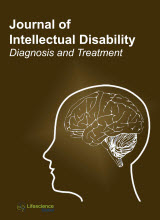jiddt
|
|
Abstract: Objective: To describe a behavioural feature, the outstretched pointing (and shaking) index finger, as a clue to the clinical diagnosis of Angelman syndrome (AS) in adults. Keywords: Angelman syndrome, behavioural phenotype, index finger.
|
|
|
Abstract: The essence of the concept "creative thinking" is considered, and its working definition is formulated. Special attention is given to the identification of pedagogical foundations of future teachers' creative thinking development, which accounting will promote the increase of the efficiency of the considered process. Future teachers' creative thinking development is advantageously realized in the course of students’ vocational training, during which it is necessary to rely not only on mental development regularities knowledge (theoretical thinking, creative thinking peculiarities, sustained attention, imagination, and integration of memory) and students' individual characteristics (maturity of motivation to creative activities, the maturity of speech, volitional powers) but also on the competently organized didactic process (training to work with the concepts and their use, application of the system of creative tasks, developing the ability to overcome intellectual difficulties). Keywords: Pedagogical, conditions, effective formation, creative, thinking, students, Art.
|
|
|
Abstract: Today, considering professional specialists' needs, the content and technology of training in career counseling from the perspective of practice are not sufficiently developed. Thus, a search for new forms, methods, and means of conducting career guidance with students is necessary. Keywords: Pedagogical, foundations, technology, vocational, guidance, adolescents.
|
|
|
Abstract: Objective: The purpose of this study is to identify the pedagogical conditions for the formation of the moral education of elementary school children with psychological characteristics using didactic works. Keywords: Personality, moral education, spirituality, national values, pedagogical condition.
|
|
|
Abstract: Work has always been a domain where individuals experience distress. However, in the current pandemic and into the unforeseeable future, job loss and unemployment stress will only exponentially increase. This manuscript represents the vision in vocational psychology which aimed to find out how the perception of the reasons for job cuts of males and females shifted in the first stage of the lockdown, to check and to compare the male’s and female’s ideas about the causes of their own long-term unemployment and their ideas about possible ways out of the unemployment in the situation of a COVID lockdown in Ukraine. Keywords: Labour market, unemployment, lockdown, job cuts, labour lay-off, COVID-19, pandemic, quarantine.
|


